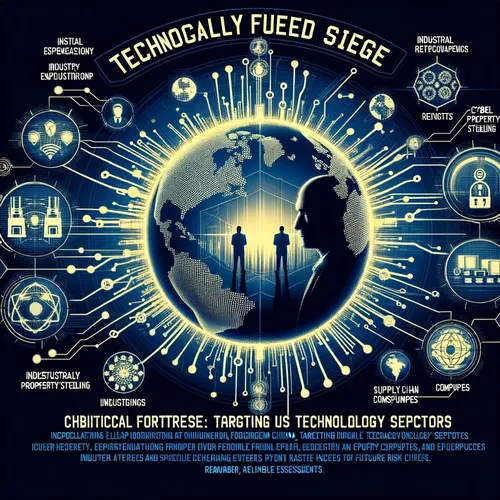Silicon Shocker: Chinas Cyber Spies Exposed - Hacking Your Smart Fridge & More!
- Author
- Quiet. Please
- Published
- Wed 30 Jul 2025
- Episode Link
- https://www.spreaker.com/episode/silicon-shocker-chinas-cyber-spies-exposed-hacking-your-smart-fridge-more--67192284
This is your Silicon Siege: China's Tech Offensive podcast.
You tuned in for Silicon Siege: China’s Tech Offensive and I’m Ting—hacker by trade, comedian by necessity. There’s no firewall tall enough to keep out these headlines, so let’s crack on.
Last week, the US Department of Justice dropped a digital bomb: the indictment of Xu Zewei and Zhang Yu, two Chinese nationals with résumés that read like a cyber-thriller. Xu and Zhang, employed by Shanghai Powerock and Shanghai Firetech, were allegedly hacking on orders from the infamous Shanghai State Security Bureau—that’s SSSB for those of us who dislike syllables. Not only did these firms run covert ops, but research by SentinelLabs has now tied them to a series of patents for some of the sneakiest surveillance tech you’ve never heard of. We’re talking tools to extract encrypted info from Apple devices, siphon off data from routers and smart home gear, and software for recovering files from supposedly fortified drives. Alexa, stop eavesdropping—but not before I check your firmware for Shanghai-based backdoors.
Let’s talk scale. Silk Typhoon—Microsoft’s polite way to say Hafnium—isn’t just a rogue clique. The July DOJ indictment broadened the tent to three companies and at least four named actors, including past bad boys like Yin Kecheng (ex-Shanghai Heiying) and Zhou Shuai, aka Coldface, who moonlights as a data broker and once ran iSoon, a firm whose internal docs went viral last year. There’s now hard evidence these companies developed and possibly sold their cyber-arsenal not only to Shanghai’s MSS but to sister spy offices across China. File this under: cyber supply chain compromise with regional flavor.
Here’s where it gets spicy. Some of the just-uncovered tech, especially from Shanghai Firetech, is tailor-made for close-range ops—targeting hardware literally within arm’s reach. That’s right, your conference-room router just became prime real estate for HUMINT: Human Intelligence, or as I call it, hacking with social skills.
Industry experts like Dakota Cary from SentinelLabs highlight how this tiered contracting model—where boutique cyber firms pull down taskings direct from state security—makes responsible attribution and deterrence a bureaucratic nightmare. The US is scrambling to keep pace. The Pentagon is now throwing serious cash at Anthropic, Google, and OpenAI for AI-enhanced cyber defense platforms, while policymakers like Senator Rick Scott are fanning the flames with fresh initiatives against Chinese espionage.
So what’s next? Experts warn we’re looking at a future of persistent, multipronged risk: from IP theft in semiconductors to manipulated firmware in critical infrastructure—think more shadow, less firewall. Mark Warner from the Senate Intelligence Committee says America’s not yet agile enough. We may win the AGI race, but lose on adoption if we stick to legacy playbooks. The new normal means relentless vigilance, smarter AI, and yes, maybe even a smart fridge that sends fewer emails to Shanghai.
Listeners, thanks for hanging out in the trenches of cyber-chaos with me. Be sure to subscribe for the freshest siege sizzlers. This has been a quiet please production, for more check out quiet please dot ai.
For more http://www.quietplease.ai
Get the best deals https://amzn.to/3ODvOta
